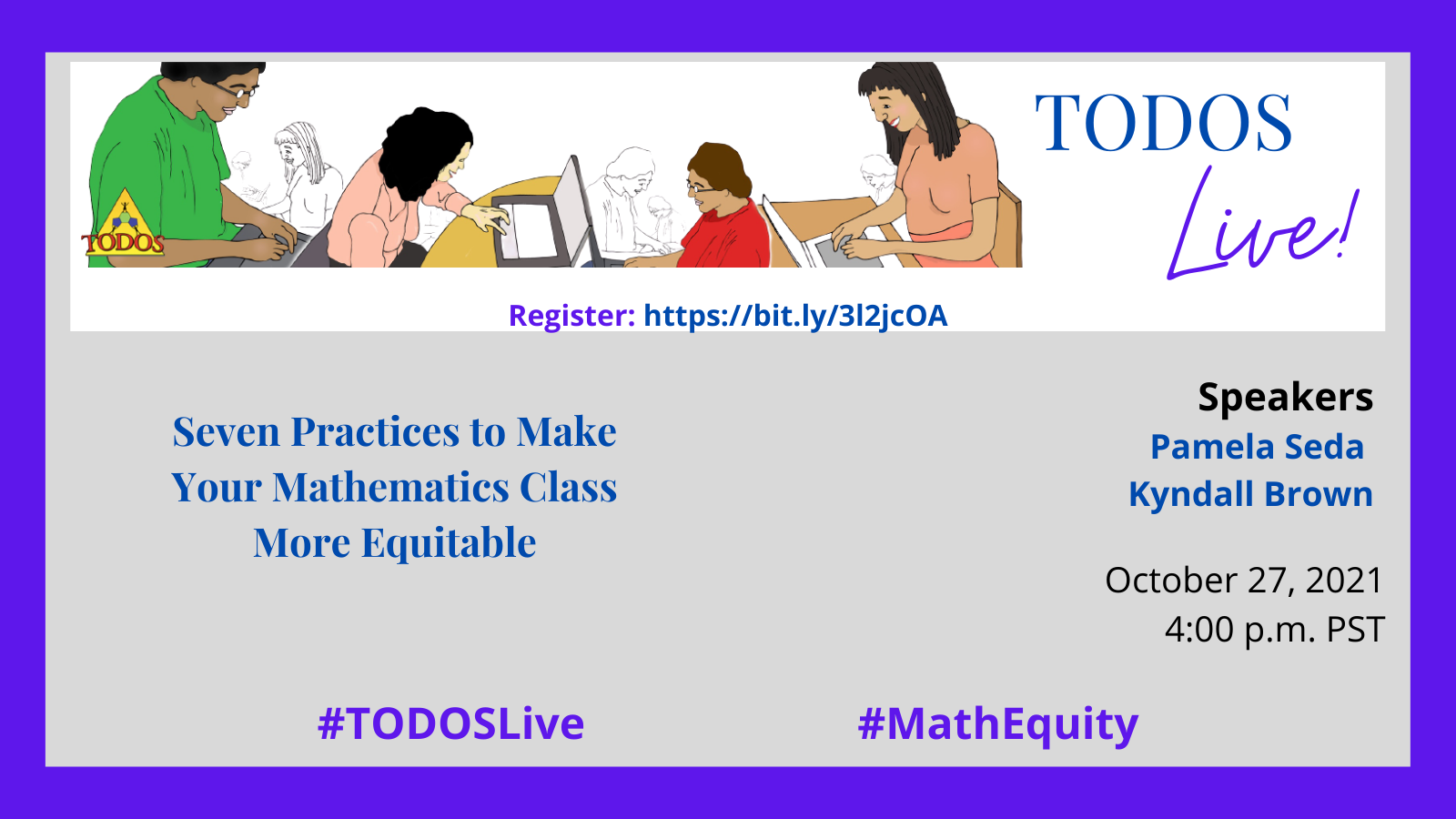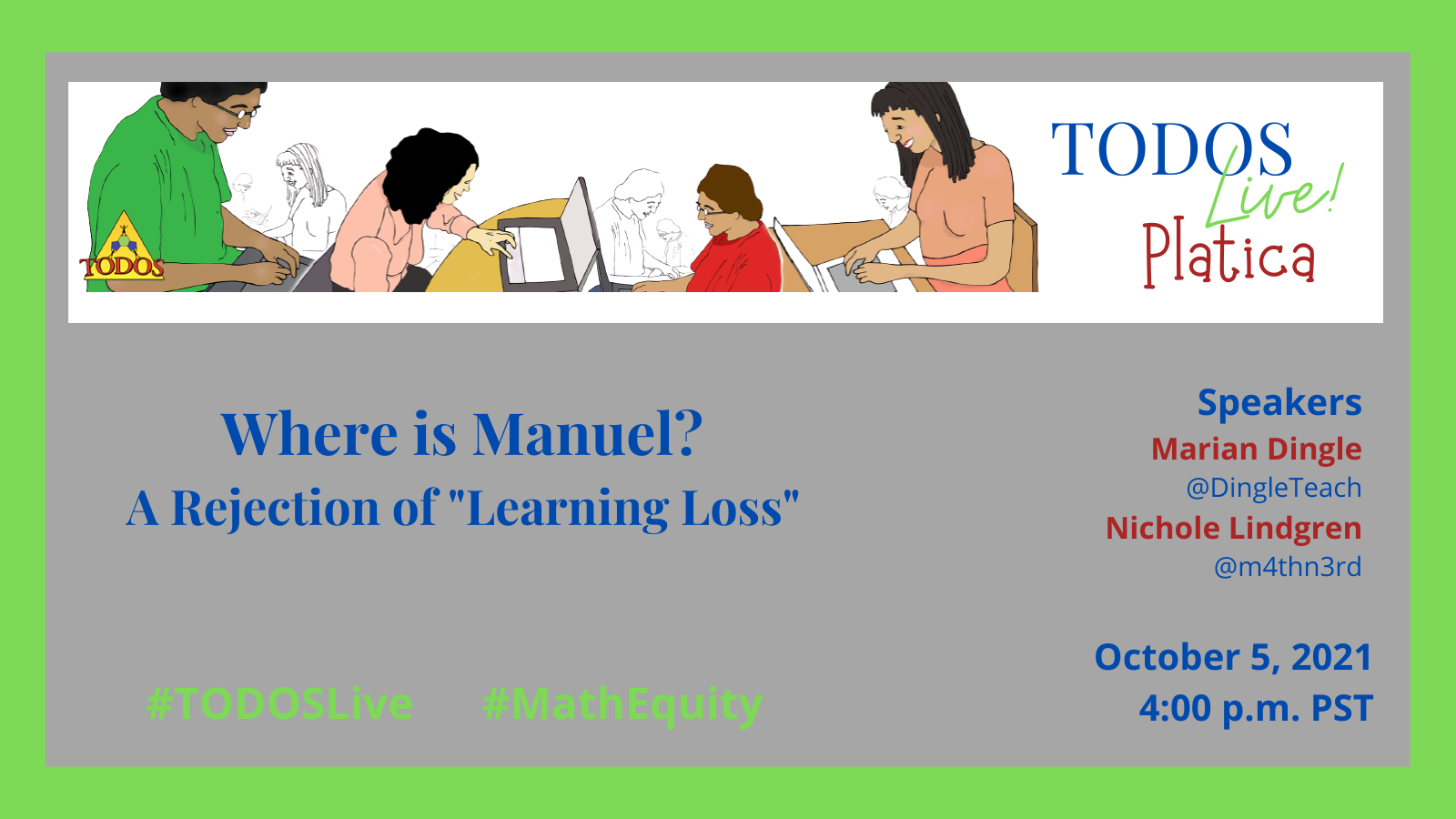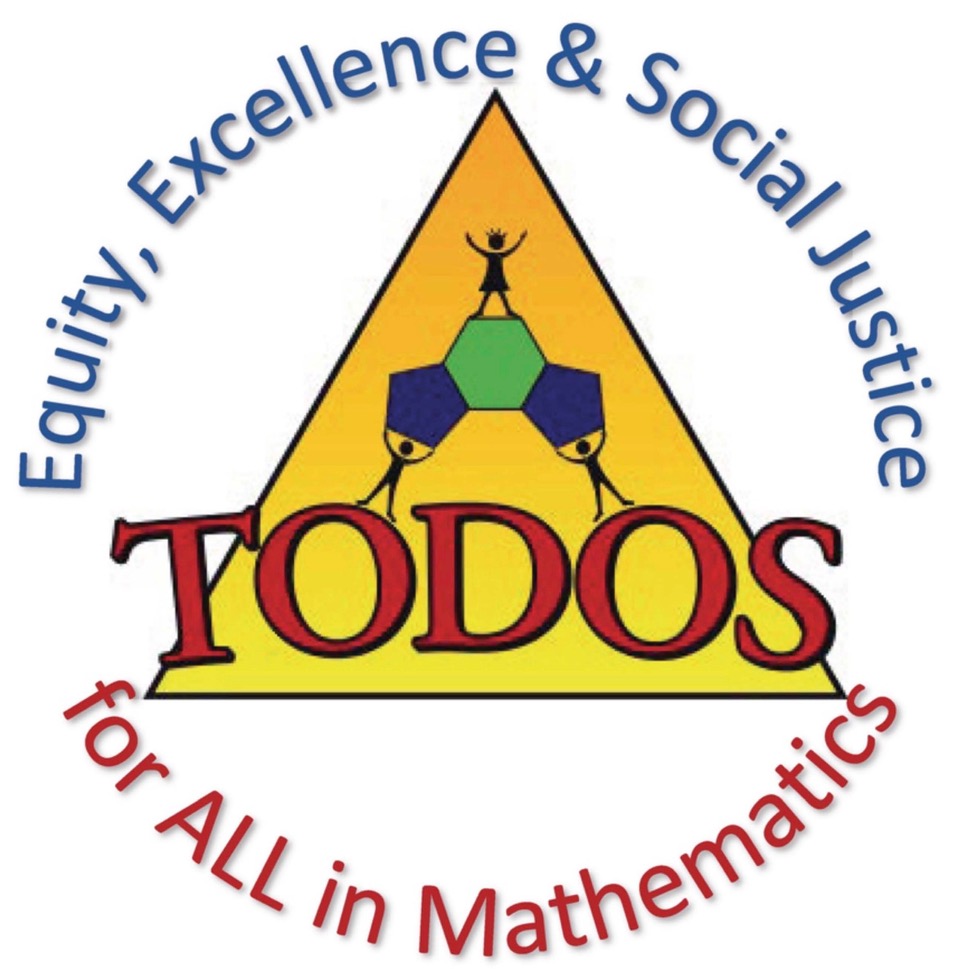TODOS Live!TODOS Live! began with funds obtained through a NCTM MET grant. Through the years TODOS Live! has had many excellent sessions and presenters. A list of previous recordings and upcoming sessions is below. Please note that due to limitations to online storage we have lost access to some of our sessions. Currently, sessions are being stored on a TODOS Live! Vimeo Channel.
Click Here for Recording
Past Sessions 2022
TODOS Live! Beyond Land Acknowledgements: A Conversation Around the Significance for Mathematics EducationAugust 31, 2022, at 4 PM PacificPresenters: Florence Glanfield, Rochelle Gutiérrez, Belin M. Tsinnajinnie It's become a common practice for many educational institutions to acknowledge the traditional territories of Indigenous peoples. You might see the territorial acknowledgements in signature lines on email messages; on websites; and you might hear them when groups of people are gathered. Each of the three panelists will share their interpretations of the significance of land acknowledgements in relation to mathematics teaching and learning. Recording LinkDe Cualquier Manera: Norms Around Choice for Multilinguals with Dis/abilitiesJune 14, 2022, at 4 PM PacificPresenter: Juanita Silva This session presents the teaching practices used to support the mathematical agency of three students who were multilingual with learning dis/abilities. The students were able to exhibit mathematics agency by using their own math strategies, explaining their thinking, convincing peers of their ideas, and take risks during group discussions. In this session you will learn what is possible when teachers use the strengths of students to support the learning of mathematics word problems. Recording LinkMy Students Scored 0%! What Should I Do Next?June 8, 2022, at 4 PM PacificPresenters: Jenny Cheng and Cecilio Dimas Let's explore the power of using students’ thinking to address emerging understandings. Participants will engage in a low-floor/high-ceiling task using a “Launch, Explore, Summarize” lesson structure with embedded Math Language Routines to contextualize student thinking for purposeful next steps. Recording Link
Recording Link
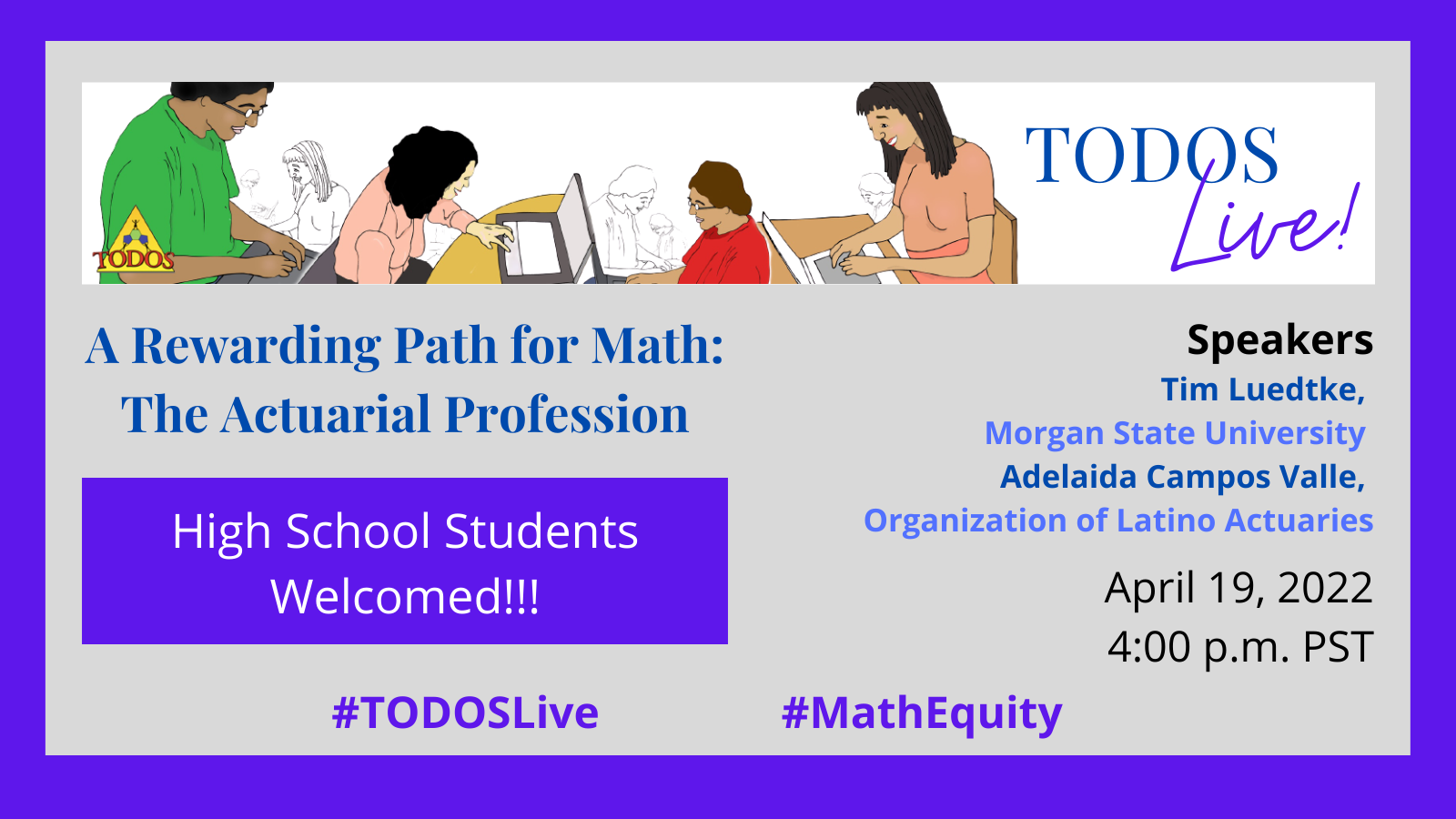
Recording Link
|
CYFEMAT: International Network of Math Circles and FestivalsDecember 1, 2021, at 4 PM PacificPresenter: Hector Rosario Join us for an informative session about the outreach work of CYFEMAT across Latin America, Africa, and the US. This currently happens in English, Spanish, and Portuguese, with plans for more languages. We will also share how to organize and run math festivals or math circles locally. Recording Link |
|
Description: In this session, we will discuss our examination of the experiences in mathematics education of Sub-Saharan African (SSA) immigrants as a way to highlight the complexities of attending to multiple versions of Blackness for classroom teachers. This work seeks to expand our understanding of Blackness and the Black experience in mathematics education and to help teachers see their Black students as more than just a monolithic Black group, encouraging that recognition through the idea of the particularity of the African immigrant experience. We will extend this discussion by also attending to the impact of coloniality on the mathematics learning experiences of SSA youth. Recording Link |
|
Recording Link |
|
Description: For too many underserved students, mathematics means confusion, failure, heartache, and feeling inadequate. Rather than risk failure, they simply choose not to "play" the game of school. In this presentation, participants will learn to use strategies of an equity pedagogy framework for engaging all students. Recording Link |
|
Recording Link |
|
|
|
August 26, 2021, at 5 PM Pacific Title: TODOS Live! Back to School Special - A Conversation with the TODOS Antiracist Position Statement Authors Presenters: Maria del Rosario Zavala, Ma Bernadette Andres Salgarino, Amber Candela, Nichole Lindgren and Erin Sylves Please join us as we kick off another amazing year of TODOS Live! sessions. This webinar offers an opportunity to have a conversation with the authors of the award-winning 2020 TODOS Position Statement, The Mo(ve)ment to Prioritize Antiracist Mathematics: Planning for This and Every School Year. The authors will share insights around the ideas and themes included in the main position paper and the four commentaries. This timely conversation will spark some ideas for impacting change in your classrooms, schools and communities as we prepare for another scholastic year. Recording Link |
|
March 31, 2021, at 4 PM Pacific Title: Teaching Mathematics for Social Justice Presenters: Robert Q. Berry III, Basil M. Conway IV, Brian R. Lawler, John W. Staley Teaching Math for Social Justice (TMSJ) is much more than the lessons teachers might implement in their classrooms. It is about the relationships they build with and among students; the teaching practices that help them do that; and the goals to develop positive social, cultural, and mathematics identities—as authors, actors, and doers. Join the authors, Robert Q. Berry III, Basil M. Conway IV, Brian R. Lawler, and John Staley, of "High School Lessons to Explore, Understand, and Respond to Social Injustice" as they unpack ideas from the book to promote thought and action toward TMSJ in the high school classroom. |
|
March 4, 2021, at 4 PM Pacific Title: Using Math Pathways to Promote Conversations about Equity Presenter: Lindsay Fitzpatrick This webinar will look at how teachers and other district leaders can use the principles of mathematics pathways along with data to reframe discussions around expectations for students. This reframing can help departments, schools and districts shift perceptions away from “getting students through” math and towards using math as a tool in helping students achieve their goals and aspirations. Recording Link |
|
March 3, 2021, at 4 PM Pacific Title: Historical and Contemporary Implications of Tracking: What do we need to consider as we attempt to “modernize” mathematics education? Presenter: Oren McClain This webinar will discuss tracking in American school, with a particular focus on mathematics, delving into how tracking has persisted and the impact it has had on Black and Latino students as well as student from low-income backgrounds. Recording Link |
|
March 2, 2021, at 4 PM Pacific Title: The Role of Curriculum Design in Promoting Equity in Mathematics Presenters: Frank Savina and Josh Recio Outside of the contact with their teacher, a large portion of students’ experiences with mathematics are defined and shaped by curricular materials. How does the design of those materials influence students’ views of mathematics and of themselves? We will have a conversation with two Dana Center course design specialists, Josh Recio and Frank Savina, on how they bring an equity lens to curriculum design for both high school and college course materials. |
|
February 23, 2021, at 4 PM Pacific Title: Changing How We Think about Mathematics and Mathematicians Presenter: Deven Shah Math is the epitome of humanity. We need to treat it as it is, filled with tools to help us describe the patterns of relationships we see in the world. The first step is to build a relationship with those tools within all mathematicians, which includes all people. Recording Link |
|
February 17, 2021, at 4 PM Pacific Title: Where are you in your Equity Journey? Presenter: John Staley During the webinar participants will engage in reflection about their equity journey and how they might take action to improve the teaching and learning of mathematics for each and every student. Resources from several mathematics education organizations will be highlighted as we consider current issues that are often encountered along the journey. Resources: PowerPointRecording Link |
|
January 26, 2021, at 4 PM Pacific Title: The Systemwide Efforts of California State University in Building a Diversified STEM Teaching Workforce Presenter: Fred Uy This session will focus on various projects and programs developed at California State University for the purpose of attracting more STEM educators to the system. Learn ways you too can do the same at your institution. Bring your questions and ideas. Recording Link |
|
January 19, 2021, at 4 PM Pacific Title: Developing ELs’ Math Language Presenter: Jim Ewing This motivating session reveals how you can develop English Learners' math language. There is a myth that math is universal, but ELs can better develop mathematical arguments if we develop their math language. After experiencing an "EL simulation," you will be ready to learn proven strategies. Recording Link |
December 1, 2021, at 4 PM Pacific
Title: CYFEMAT: International Network of Math Circles and Festivals
Click Here to Register
Past Sessions 2020
|
December 1, at 4 PM Pacific Title: Disrupting Mathematical Microaggressions Presenter: Robert Q. Berry, III Microaggressions are brief and commonplace verbal, behavioral, or environmental indignities—whether intentional or unintentional—which communicate negative slights and insults to people. Francis Su defined mathematical microaggressions as ways we communicate to students "you don't belong in mathematics." This session unpacks microaggressions and mathematical microaggressions in mathematics teaching and learning. Recording Link |
|
November 11, at 5 PM Pacific Title: The Power of Gradual Reveal in Nearly Everything We Teach in Math Teachers have known for years the power of gradual reveal when teaching reading. It’s time to apply this strategy to mathematics. In this session we’ll look at using the easy to adopt technique of gradual reveal with word problems, tables of data, graphs, patterns and geometric figures – all in support of generating higher levels of interest, encouraging greater motivation and making the mathematics much more accessible to all students. Presenter: Steve Leinwand Resources: Recording Link |
|
October 29, at 4 PM Pacific Title: Teaching Fraction Concepts in a Remote Learning World Fraction concepts may be one of the most challenging topics to teach and learn -- and now we face the challenges of teaching them remotely. Let's look together at a few fraction concept lessons and explore together how to make them more dynamic and effective in a COVID challenging environment! Presenter: Shelley Kriegler Recording Link |
|
October 28, at 4 PM Pacific Title: Middle School Mathematics: Supporting Your Student with Math at Home We will look at some strategies and best practices for supporting students with math. We will explore a few resources and do some math together. Presenter: Suzanne Damm Recording Link |
|
October 27, at 4 PM Pacific Title: Mathematical Games as Springboard Activities to Different Types of Proof Mathematical games are great opportunities to introduce students to important practices like making and investigating mathematical conjectures as well as developing and evaluating arguments. In this webinar a game will be presented, and the players, while looking for a winning strategy, will have fun and do significant mathematics. Presenter: Greisy Winicki-Landman Recording Link |
|
October 22, at 4 PM Pacific Title: Moving Achievement Together Holistically: Elder Inspired Approach to Math Education In this session, I will share understandings developed from long-term collaborative work done in Mi’kmaw communities of Atlantic Canada. The session will explore ways to teach mathematics from an Indigenous perspective, looking beyond ethnomathematical investigations to explore the ways in which Mi’kmaw epistemology or L’nui’ta’simk, can be used to root pedagogical approaches in indigenous knowledge systems. I will show examples from an on-going research project called Moving Achievement Together Holistically (MATH) as a way of demonstrating what it looks like to teach from this culturally-based approach. Sample activities will be shared and we will discuss how these ideas are good for all students but essential for some. Presenter: Lisa Linney Borden Recording Link |
|
October 21, at 4 PM Pacific Title: Exploring Social Justice Through Mathematics: The Possibility and Necessity of Social Justice Mathematics This 60-minute workshop will have two core elements. 1. We will do mathematics together as a community by examining some prescient social justice topics that are impacting marginalized communities and how mathematics can be used to explore those situations. Participants will be working/doing mathematics in small groups and presenting findings in through whole group discussions. 2. We will discuss why this work is necessary and vital, what needs to be done before we as teachers attempt to do this work and how this framing is critical to understanding the potential of exploring mathematics in BIPOC communities. Moreover, we discuss how through the work of Rochelle Gutiérrez, Danny Martin, David Kung and others that we have the opportunity to reframe and redefine math circles using an equity and social justice framework. |
|
October 19, at 4 PM Pacific Title: Toxic Trauma, Stress and the Brain We now know that a child’s brain is most flexible during the first few years of life. These early years are a critical period for learning, growth, and development. Brains grow through touch, talk, sight, and sound. What happens when children don’t get this? What happens in early childhood can matter for a lifetime. We must recognize and address problems before they get worse. Research shows that toxic stress and adversity, such as poverty, abuse, or neglect can weaken the developing brain architecture and permanently set the body’s stress response system on high alert. The good news is that science shows that providing stable, responsive, nurturing relationships with children and adolescents can prevent and even reverse the damaging effects of early life stress. The number of caring adults in a child’s life is directly related to their success." Presenter: Lisa McKenzie Recording Link |
|
August 18, at 4 PM Pacific Title: Virtual Math Talks, Exploring Ways to Stay Rooted in Meaningful Collaboration and Discourse Participants will engage in discussion about attributes of powerful Math Talks and how to replicate them in the virtual space. Additionally, we’ll experience & reflect upon 2 virtual Math Talks as a community of learners. Presenter: Cecilio Dimas Recording Link |
|
August 11, at 4 PM Pacific Title: Subversive Teaching to Rehumanize Mathematics The combined events of Covid, Black Lives Matter, and climate change have opened the door for many teachers to question what is happening in the world and what is our place in it? This session supports teachers to reflect on what is considered “normal” in mathematics teaching and learning and what it will take to rehumanize mathematics when so many people and institutions are actively protecting the status quo. Presenter: Rochelle Gutiérrez Recording Link |
|
July 22, at 4 PM Pacific Title: Global Mathematics: An Elective Mathematics Class for ALL Students This session will describe how one school created an elective course, Global Mathematics, that helps students understand and critique the world while also experiencing wonder, joy, and beauty. This course engages students at every ability level through the study of the history of mathematics and the usefulness of mathematics to address global, regional, and local Presenter: Dave Ebert Recording Link |
|
July 14, 2020 at 4 PM Pacific Title: Supporting the Learning of All Students by Working Smarter: A framework for Math Teaching and Learning Presented by Teruni Lamberg Supporting student learning involves taking into account the process of teaching that includes setting up the physical space, developing routines, planning lessons and facilitating discussions. These are things that teachers naturally do. However, how these activities are enacted impacts student learning. Learn how to support the learning of all students by using a simple framework designed to improve teaching. The goal is to work smarter, not harder to get results in student learning. Presenter: Teruni Lamberg Recording Link |
|
July 10, 2020 Title: The Changing Landscape of Mathematics Education The current health pandemic has brought equity and social justice issues to the fore, while concurrent social movements have helped build momentum towards antiracist teaching in mathematics education. The potential in this mo(ve)ment is what brings us together, to reflect and consider what we must do going forward. Five panelists from around the United States representing various positions in mathematics education will share their reflections and ideas on the following questions:
Panelists: Margarita Barraza, Marian Dingle, Linda M. Fulmore, Rochelle Gutiérrez, Lisett Sierra Moderator: Luz Maldonado Rodríguez Recording Link |
|
June 24, 2020 Title: Rethinking the SummerSlide: A TODOS Live! event FOR PARENTS and teachers (K-5 focus) Many parents and teachers dread the loss of academic learning that happens during the summer months. This phenomena has been termed “the Summer Slide”. In this session, we’ll discuss how to rethink the summer slide from an asset-based perspective, drawing on the strengths of students and their most valuable learning resource, their families! Parents will leave with practical ideas of how to evaluate online resources, games, and household activities as part of supporting your student to maintain or rekindle their interest in mathematics, reclaim your own mathematics identities, and embed mathematics as a frequently occurring aspect of living your life in your home communities. Presenter: Maria del Rosario Zavala Recording Link |
|
June 10, 2020 Title: Exploring the Shifts in our Student's Social/Emotional Well-Being Educators will be invited to reflect on the changing patterns of human interactions that impact instruction. We will share how we are navigating social distancing and what we are doing to adjust to new norms in the school experience. Presenter: Amy Brooks Recording Link |
|
June 2, 2020 Title: Four Tools to Engage ELs in Math, for both the Classroom and Distance Learning Teachers and administrators, your effort during Covid-19 has been exemplary. Now, let’s get ready for the fall and learn strategies that are effective both in the classroom and remotely. Presenter: Jim Ewing Recording Link |
|
May 20, 2020 Title: Four-Dimensional Education: Equity and Access to Education and Jobs Among those who teach Juveniles, the Incarcerated, and Adults, building curriculum around the concept of Four-Dimensional Education (Fadel, Bialek, & Trilling, 2015) is a way to innovate our curriculum and to help teach our students the creativity, critical thinking, problem-solving, communication, and collaboration skills that they will need to move up the socio-economic ladder in the 21st Century. Presenter: Greg Ludwa Recording Link |
|
May 13, 2020 Title: Using Math Language Routines to Launch Performance Tasks, Explore the relationship between language & math to shift mindset & identity Participants will engage in routines that develop both language and mathematics in an authentic & purposeful way, while moving away from answer getting or re-stating steps. Presenter: Cecilio Dimas Recording Link |
|
May 7, 2020 Title: Supporting Preservice Teachers: Responsiveness to Students During COVID-19 and Transition to Online Courses in Teacher Ed In this QTE Trevor Warburton discusses what his students (preservice teachers) are experiencing during COVID-19, how that impacts their learning from home, and his attempts at equitable teaching during this time. Presenter: Trevor Warburton Recording Link |
|
April 14, 2020 Title: Disruptive Numbers: The Chaos Numbers Bring to Uncover Hidden Stories In the pursuit to challenge inequities in math teaching and learning "Disruptive Numbers" is a tool to provoke math discourse in class to unravel the chaos that numbers bring to uncover hidden stories that perpetuate partisanship in our society. Presenter: Ma Bernadette Salgarino Resources: https://bit.ly/disruptvnmbrstodoslive https://bit.ly/dnumbersresources Recording Link |
|
April 9, 2020 Title: Tests, Assessments and Learning Math: Equitable Alternatives in Pandemic Times While many schools are moving towards online, we have the opportunity to create engaging learning environments for students. This webinar will investigate traditional definitions of success and learning while offering practical alternatives to testing in the online setting. In addition, considerations for challenges in implementation will be discussed as we transition into distance learning and remote instruction. Audience: Grade 6 through college; teaching remotely Panelists: Dr. Vanson Nguyen and Dr. Amanda Ruiz Resources: Recording Link |
|
April 7, 2020 Title: Educator-Led Professional Development to Support Equity and Access: The Instructional Leadership Corps In the Instructional Leadership Corps (ILC), California educators organize local professional development to spark iterative changes in practice. The ILC develops and supports educators to lead ongoing learning within their own communities. In this webinar, participants will learn about the ILC model and how it supports equity and access across grade levels and content areas by highlighting ILC work in Madera Unified School District. Panelists: Melissa Gilbert, Linda Tolladayn, and Dion Burns Resources: Recording Link |
|
March 24, 2020 Title: Pop-Up Panel/Webinar, "Math When Schools are Closed" Panelists: Maria Del Rosario Zavala, Melissa Adams, Luz Maldonado, Gloria Brown Brooks, and Ricardo Martinez Resources: MAPPS Math and Parent Partnerships (Kyndall Brown, Marta Civil) CRR Impact Workshops are open for all teachers and parents Link to Materials in Google Folder Recording Link |
Season Nine
|
Title: Mathematics Intervention: Structures and Strategies to Support Struggling Learners Struggling learners deserve programs that help them catch up. Yet typically support classes focus on below grade level skills – an insidious form of tracking that does little to help students to do better in their core mathematics class. Based on research and reality, we will explore six principles that may promote shifts in traditional thinking about mathematics intervention, experience principles in the context of proportional reasoning, and leave ready to address this important equity issue. Presenter: Shelley Kriegler Recording |
|
Title: Countering Deficit Myths of Students with Dis/Abilities and Conceptualizing Possibilities: A Culturally Responsive and Relational Approach to Mathematics. Presenter: Cathery Yeh Recording |
Season Eight
Season Seven
|
Title: 7.1 Effective Teaching Practices to Support English Language Learners Learn about the specific demands of teaching mathematics for English Language Learners, especially related to modeling and communication math practices. Support students to make assumptions and reflect on their solutions by means of technology, comparisons of word and modeling problems, and well-planned interrelated social and analytic scaffolding. Presenter: José Francisco Sala García Recording |
|
Title: Talk Less, Listen More Listening is one of the most important tools in a teacher’s toolbox. In this session, we’ll explore a variety of rich mathematical tasks, focused on early number, operations, and equality concepts that provide authentic opportunities for us to learn to better listen to our students. We’ll also engage in some mathematical activities as an exercise in learning how to truly listen to our student’s ideas and conceptions. Presenter: Zachary Champagne Recording |
|
Title: Cultural and Linguistic Diversity: Resources for Teaching and Learning This presentation centers the idea of diversity as a resource for mathematics teaching and learning. The focus is on how to build on the diversity present in our classrooms (in particular, language and cultural diversity) to enhance the mathematics learning opportunities for all of us (teachers, students, and parents). Marta will discuss the concept of valorization of knowledge and how that may affect how we interact with diversity in the classroom. Presenter: Marta Civil Recording |
Season Six
|
Title: 6.1 Weaving Indigenous Perspectives & Mathematics: Landscape of Success for ALL Learners. Effective Teaching Practices to Support English Language Learners Presenter: Florence Glanfield Recording of Part 1Recording of Part 2 |
|
Title: 6.2 Maximizing Algebra Access through Conversational Lecture and Tablet technology In this session, Angela discussed her journey in learning how to give students who have previously failed a mathematics course a positive, uplifting experience through conversational lectures and using a tablet. She demonstrated how she uses the tablet to improve the experiences of students with a wide variety of needs. Presenter: Angela Thompson Recording |
|
Title: 6.3 Some Reflections about the Visual Aspects In the Mathematics Learning The creation, interpretation, and reflection about visual displays, is a major component in the mathematics learning process at all levels. We will consider some of the different roles that visualization plays in that mathematics discourse, and we will reflect on ways teachers can support all the students in that process. Presenter: Greisy Winiki Landman Recording |
|
Title: 6.4 Statistics: A Pathway through the Standards Presented This session aims to give teachers a sense of the continuity in content as the study of data moves from elementary through middle school to high school by examining similar data displayed in graphs that change as students progress through the standards. Panelists: Diane Kinch and Kyndall Brown Recording |
|
Title: 6.5 Burst Webinars: Expressions, Equations, Patterns, and Algebra. The Pizza Place - A real-life context to introduce variables expressions and equations. Presenter: Shelley Kriegler Recording of The Pizza PlaceRecording of All Others |
|
Title: 6.6 From Using to Understanding Tools: Reimagining the Protractor to Support Student Mathematical Agency. Presenter: José Manuel Martínez Recording |
|
Title: 6.7 Essential Understanding of Geometry for English Language Learners This presentation shows a set of tasks that support the centrality of geometry. The formula for the area of a triangle and the Pythagorean theorem are explored using decomposition and rearrangement. The blackline masters have been designed in different language proficiency levels without modifying math goals so that students can respond to them in accordance with their language acquisition stage. Social and analytic scaffolding are interrelated, and mathematical discourse is focused on the key practices of argumentation, strategic usage of tools, and attention to precision. Presenter: José Francisco Sala García Recording |
|
Title: 6.8 Using Discourse to Access Language and Mathematics for English Learners Extensive use of discourse in the classroom is a key practice to support the learning of English while learning mathematics. English learners are in varying stages of English language development, and discourse will increase their productive (oral and written) and receptive (listening and reading) language functions in addition to their comprehension of mathematics concepts. The Standards for Mathematical Practice expect students to reason, construct viable arguments, and critique the reasoning of others, among other practices. Thus, classroom teachers need to provide support for students’ English language development to engage in these practices. In this webinar, Dr. Susie W. Håkansson shares the rationale for using discourse in the classroom, the role of productive and receptive language functions in the learning of mathematics, as well as examples of how to increase discourse in the classroom. The presentation covers: Challenges in learning English Using discourse (including the role of productive and receptive language functions), Language in the mathematics classroom, Cognitively-demanding mathematics tasks, Examples of discourse in the classroom, Equity, and excellence Learn how to support your English learners while they are learning mathematics. This recorded webinar is designed for mathematics educators, administrators, coaches, classroom teachers, as well as mathematics teacher educators. Presenter: Susie Håkansson Recording |
|
Title: 6.9 Engaging the English Language Learner to Grasp Growing Sequences Support language development and productive struggle, and motivate the English language learner in algebraic thinking by examining growing pattern tasks through well-planned interrelated social and analytic scaffolding. Also, engage in mathematical discourse focused on the argumentation, structure, and regularity Presenter: José Francisco Sala García Recording |
Season Five
|
Title: Our Questions and Their Discourse are the Keys to Their Engagement and Learning Language rich classrooms where students are actively engaged in thinking, communicating, and problem-solving because the questions we ask and the discourse we enable are the classrooms in which children thrive. We'll look at a range of examples of the questions that stimulate discourse and the amazing things that emerge when an answer is only a first step. Presenter: Steve Leinwand Recording |
|
Title: Weaving Indigenous Perspectives & Mathematics: Landscape of Success for ALL Learners (Part 1) In this session, we will explore the different ways in which Indigenous perspectives are woven into mathematics and mathematics teaching and learning and the ways in which those perspectives might inform success for ALL learners. Presenter: Florence Glanfield Materials: Recording |
|
Title: Engaging Every Learner Through Hands-On Instruction A solid understanding of fractions is critical for student success in mathematics. The language of fractions is precise and often confusing to learners. Manipulative models provide a structure for helping students master the vocabulary of fractions and see the connections between whole number operations and fraction operations. This workshop will share strategies for using manipulatives to model and build a conceptual understanding of fraction operations. Presenter: Sara Moore Recording |
|
Title: STEM’ify Your Community: STEM for ALL and ALL for STEM Stamford has instituted the Stamford STEMfest, which is a day of free activities centered around STEM. This festival is modeled after Ireland's Maths Week. The Stamford STEMfest goals include: 1) building an awareness about STEM for students and their parents, 2) demonstrating to students how much fun these disciplines can be, 3) showing students how these disciplines are inherent in many of the things we do every day, and 4) having students learn about the career and college opportunities in STEM. This event has been extremely successful in getting all students and the community to learn about STEM. The event is now being done in other cities around the country. Learn about this event, how it has impacted the community, and how you can get involved! Presenter: Carrie Chiapetta Recording |
|
Title: Making Sense and Creating Connections with Transformations One of the new content highlights of the CCSS-M is the use of transformations. During this session, teachers will make sense of their definitions, their progression, and the different roles they play in mathematics, not just in geometry. Teachers will be invited to reflect on the different modalities used to maintain rigorous but accessible discourse and to discuss how to implement these approaches with their own students. Presenter: Greisy Winicki Landman Materials: Recording |
Season Four
|
Title: Using Representations to Introduce Early Number and Fraction Concepts Using various concrete materials and drawings can help elementary students make the connection to developing conceptual understanding. This connection is especially important for ELL students. This session will focus on concrete representations for key number concepts in the Common Core. Presenter: Linda Gojak Materials: Recording |
|
Title: Strategic Uses of the Number Line In this session, participants will experience and reflect on some activities developed for teachers and their students. Some of the hidden assumptions and conventions about the use of the number line in mathematics will be made explicit. We will particularly focus on its strategic uses while making sense of quantities and the operations among them (MP2). Presenter: Greisy Winicki Materials: Recording |
|
Title: Fractions on a Number Line The CCSS-M emphasizes the use of the number line as a model for fractions. This session will increase teachers’ conceptual understanding of fractions using the number line approach through problem-solving and discourse and will include activities and materials for use in the classroom. The CCSS-M Standards for Mathematical Practice and the English Language Proficiency Development (ELPD) Framework will be infused. Presenter: Susie Håkansson Materials: Recording |
Season Three
|
Title: Enhancing the Common Core with Culturally Responsive Mathematics Teaching - General As more states move to the Common Core, we must ask ourselves as teachers of mathematics how we will support all our students to meet these increasing content and practice standards. This webinar will discuss key principles of Culturally Responsive Mathematics Teaching in relation to Common Core mathematical practices and implementation. The focus will be primarily on k-8 mathematics with a special emphasis on children's mathematical thinking, discourse, language, culture, and social justice. Presenter: Julia Aguirre |
|
Title: Integrating the Standards for Mathematical Practice with Polynomial Multiplication - Grades 9-12 Explore how the Standards of Mathematical Practice (SMP) can be integrated into a lesson on exploring multiple methods to multiply polynomials. Examine how the SMP can support the learning of all learners, with a focus on ELL learners in the mathematics classroom. Discussions will include strategies for integrating the SMP into lessons for English Language Learners and how these practices promote the success of all learners. Teachers are welcome to share their strategies for success, as well! Panelists: Kim Csulak and Ann McCallum Materials: Recording |
|
Title: Formative Assessment in the Age of Common Core: What can we learn from SBAC and PARCC? The CCSS Assessments are quickly approaching and many educators, are wondering what is in store and what steps they can take now to set their students(especially their ELLs) up for success. Presenter: Melissa Hosten Materials: |
|
Title: Facilitating the MPs from the CCSSM for ELLs. Who says Teaching is easy! (grades 3-5 focus) The mathematical practices can be a framework to determine how successful our tasks are. Furthermore, we need to find tasks that facilitate all students participating in the MPs. Suggestions will be discussed for ways to promote the MPs to English language learners while meeting other students’ needs at the same time. Teachers are welcome to share their favorite tasks. Presenter: Jim Ewing Materials: Recording |
Season Two
|
Title: Mixing in Math Webinar Learn about the over 200 resources in Mixing in Math, a set of FREE materials in English and Spanish that add math to fitness, nature, cooking, and daily routines. Presenter: Nuria Jaumot-Pascal Materials: Recording |
|
Title: Effective Mathematics Activities for English Language Presenter: Don Balka Recording |
|
Title: Learning from English Learners in Mathematics - Voices Unheard, Methodologies Unused. Presenter: Higinio Dominquez Materials: Recording |
|
Title: Mathematics and First Peoples of North America. Presenter: Florence Glanfield Materials: Recording |
|
Title: Common Core State Standards (Part 1) - The Mathematical Practices in Action. Presenter: Nora Ramirez Materials: Recording |
|
Title: Common Core State Standards (Part 2) - Where are we? Where are we going? How do we get there? Presenter: Nora Ramirez Materials: |
|
Title: Equitable Practices in the Math Classroom Presenter: Judit Moschkovich Materials: Recording |
|
Title: Using Structure to Support ELLs: How the CCS for Mathematics Can Work for ELL Instruction (Part 1) Presenter: Melissa Hosten Materials: Recording |
Season One
|
Title: Using Concepts as Scaffolding for Mathematics English Language Development Presenter: Harold Asturias Materials: Recording Download PDF |
|
Title: Achieving Excellence and Equity for Latino Students: A View through Their Eyes Presenter: Kathryn Chval Recording |
|
Title: Multiple Representations for Rate of Change Presenter: Ed Nolan Materials: Recording |
|
Title: Investigating With Concrete Models Panelists: Heather Navarro and Noel Villegas Materials: Recording |
|
Title: Building the Bridge to Abstract Understanding Presenter: Heather Navarro Materials: Recording |
|
Title: Beyond the Achievement Gap: Helping your Students Play/Change the Game Presenter: Rochelle Gutierrez Materials: Recording Download PDF |
|
Title: Supporting Proof for ELLs, Struggling Learners, and Others Presenter: Melissa Hosten Materials: Recording Download PDF |
|
Title: Supporting Children’s Numerical Operations with Math Games and Graphic Organizer Panelists: Allison Davis & Socorro Tapetillo Materials: Recording |
|
Title: Geometric Reasoning and Problem Solving Presenter: Mark Driscoll Download PDF |
|
Title: Thinking about a PLC/Lesson Study with a TODOS Twist? Panelists: Bob McDonald & Nora Ramirez Materials: Recording |
|
Title: Supporting Students' Engagement in Meaningful Mathematics Through Play Presenter: Amy Parks Materials: Recording |
|
Title: Is it group worthy - What makes mathematics tasks worthy of group solving? Presenter: Sandra Crespo Materials: Recording |
Other Past Sessions
|
Title: We All Can Focus on Excellence and Equity Presenter: Susie Håkansson Recording |
|
Title: QTE - Incorporating Equity into the Lesson Study Process - Including Q&A's Presenter: Susie Håkansson Recording |
|
Title: Promoting Algebraic Thinking through Visual Pattern Tasks for English Language Learners Presenter: Jose Sala Garcia Recording |
|
Title: Visual Geometry Proofs: Creating Rich Language Experiences Without Language! We will explore ways to simultaneously promote language development and concept development using visual proofs for areas and volumes of shapes. This was the first recording on our new platform, and there are some problems with the audio. Materials: Recording |

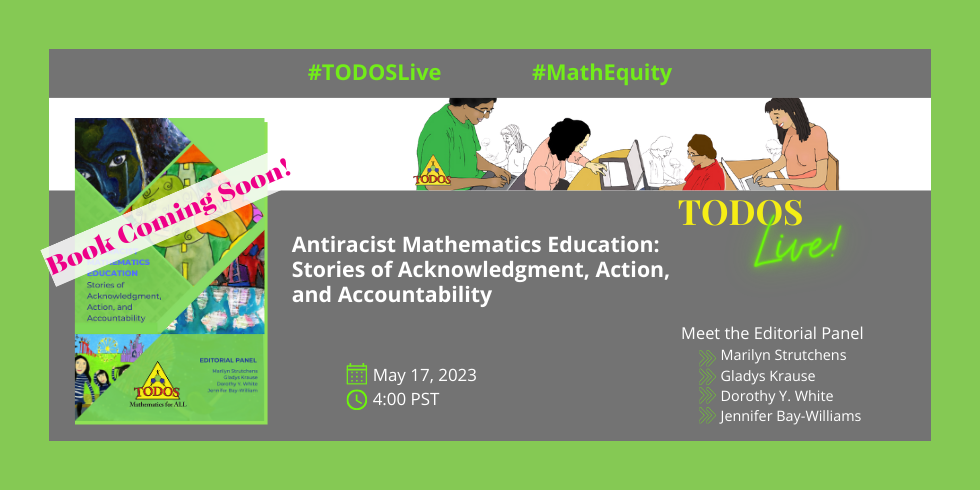
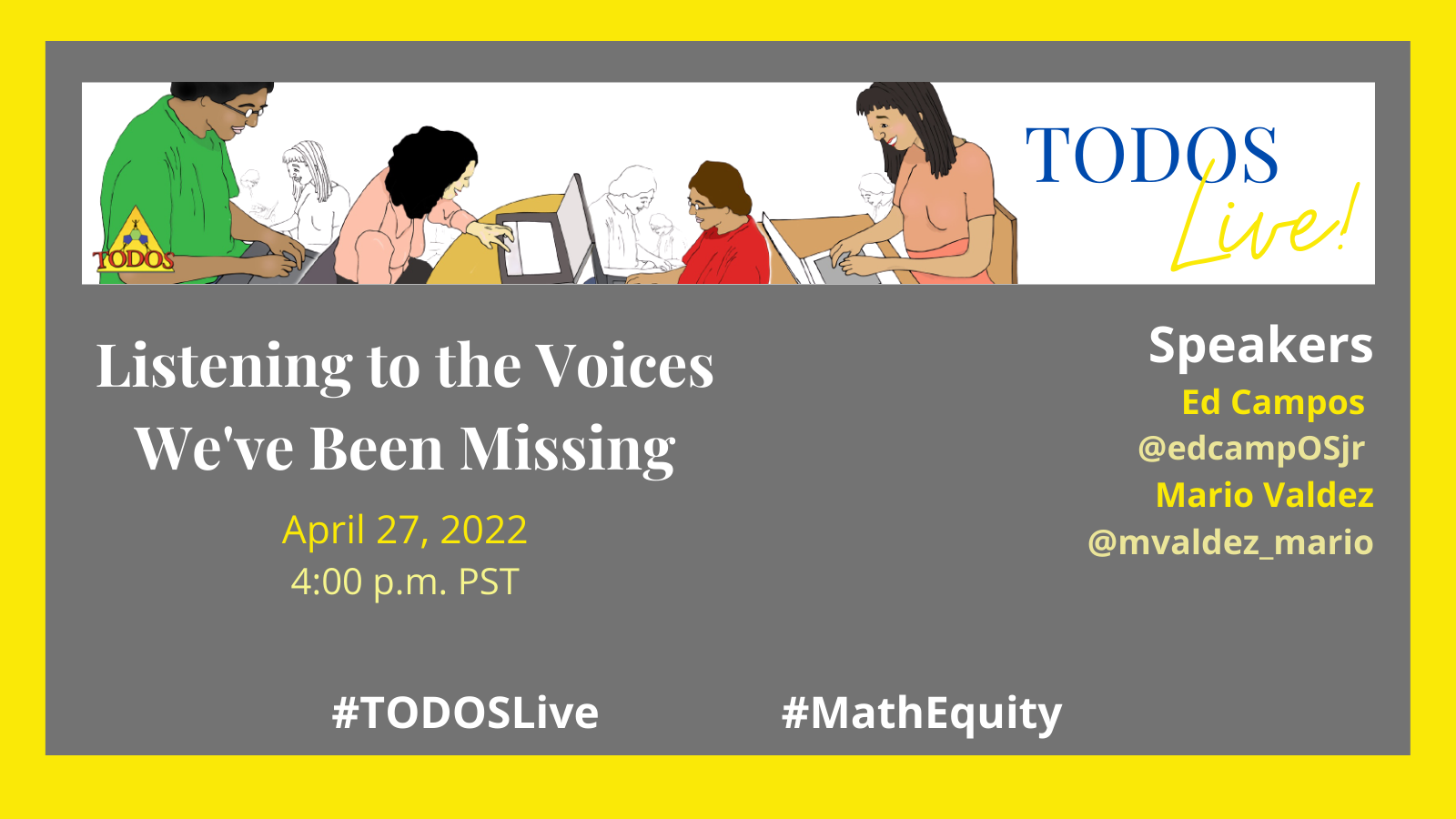
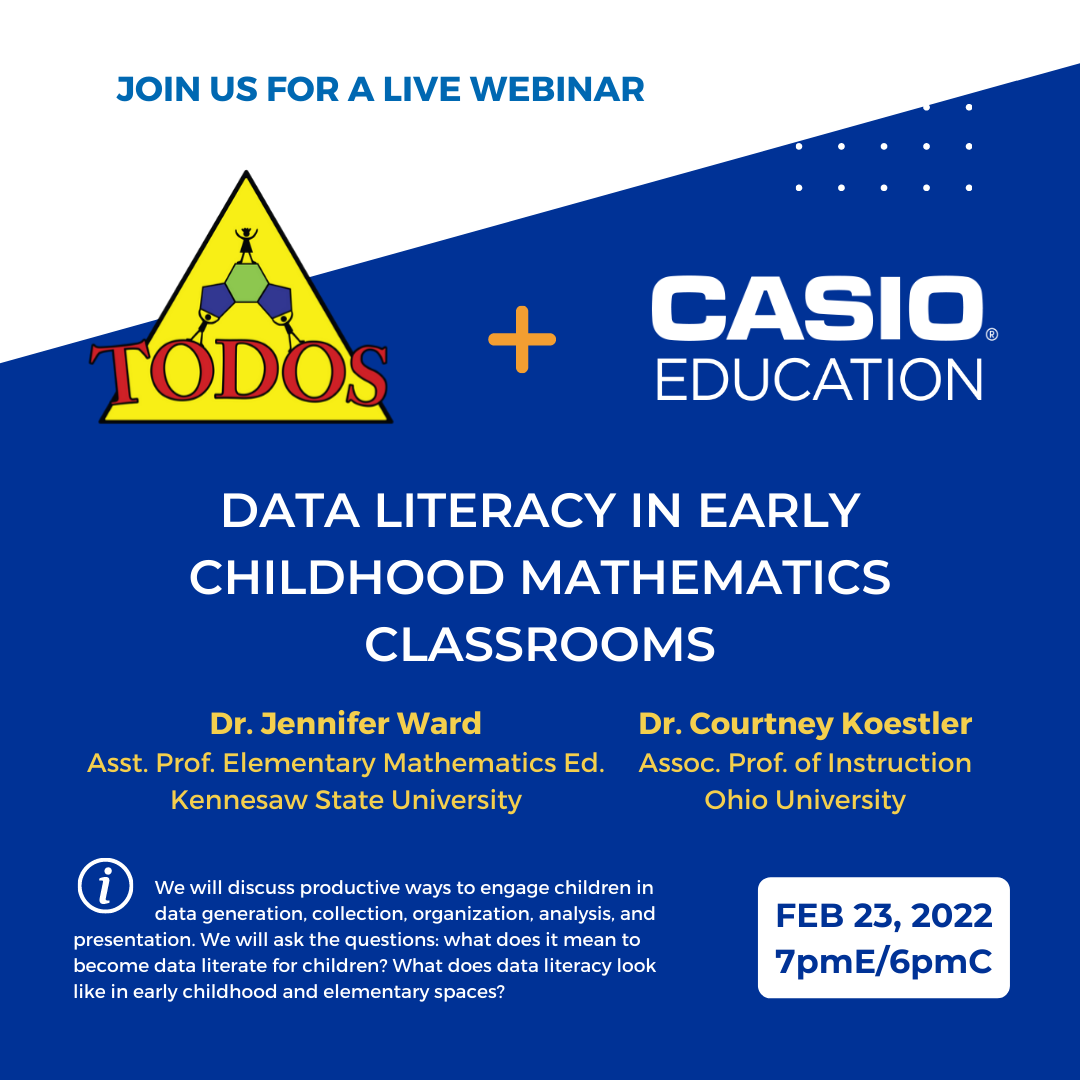
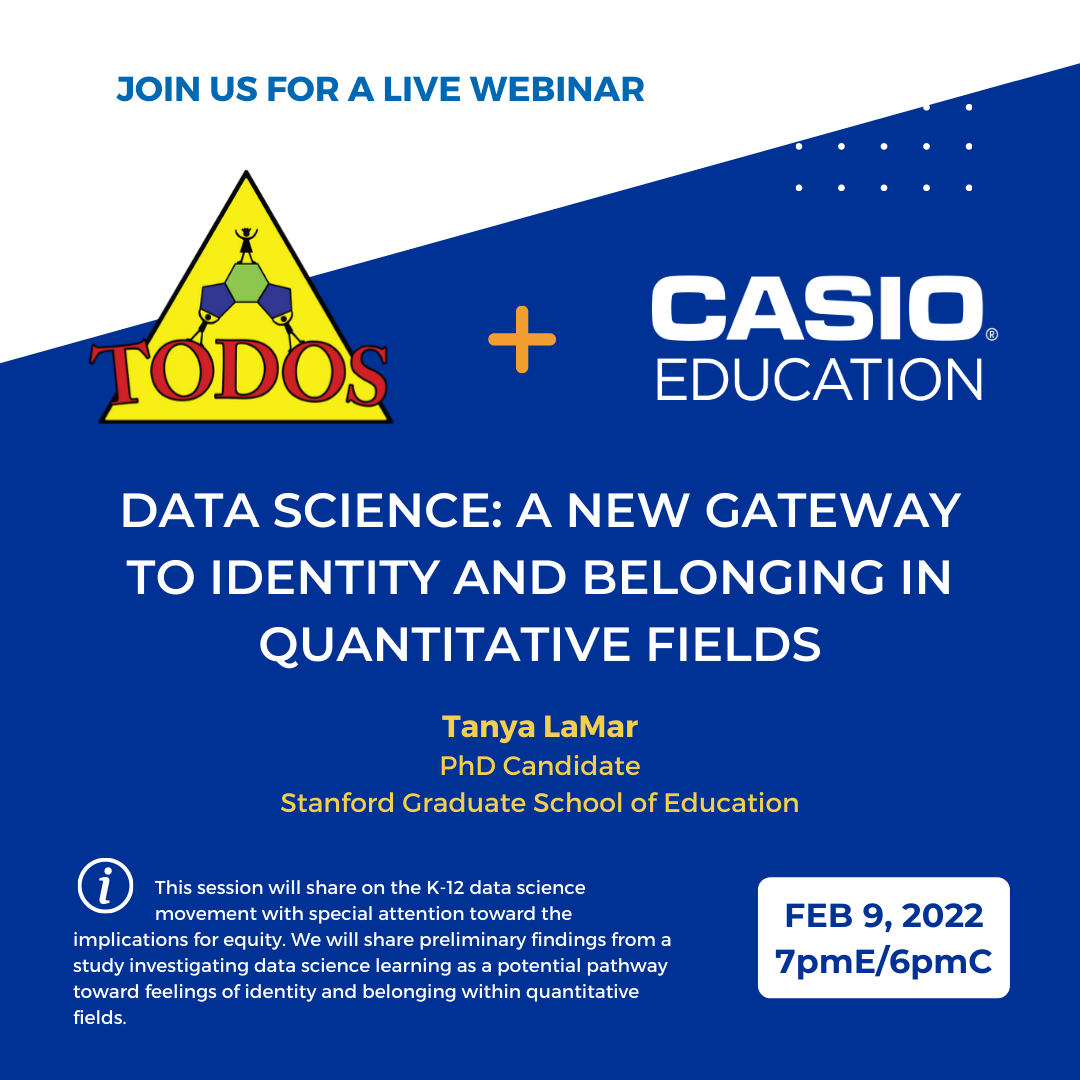
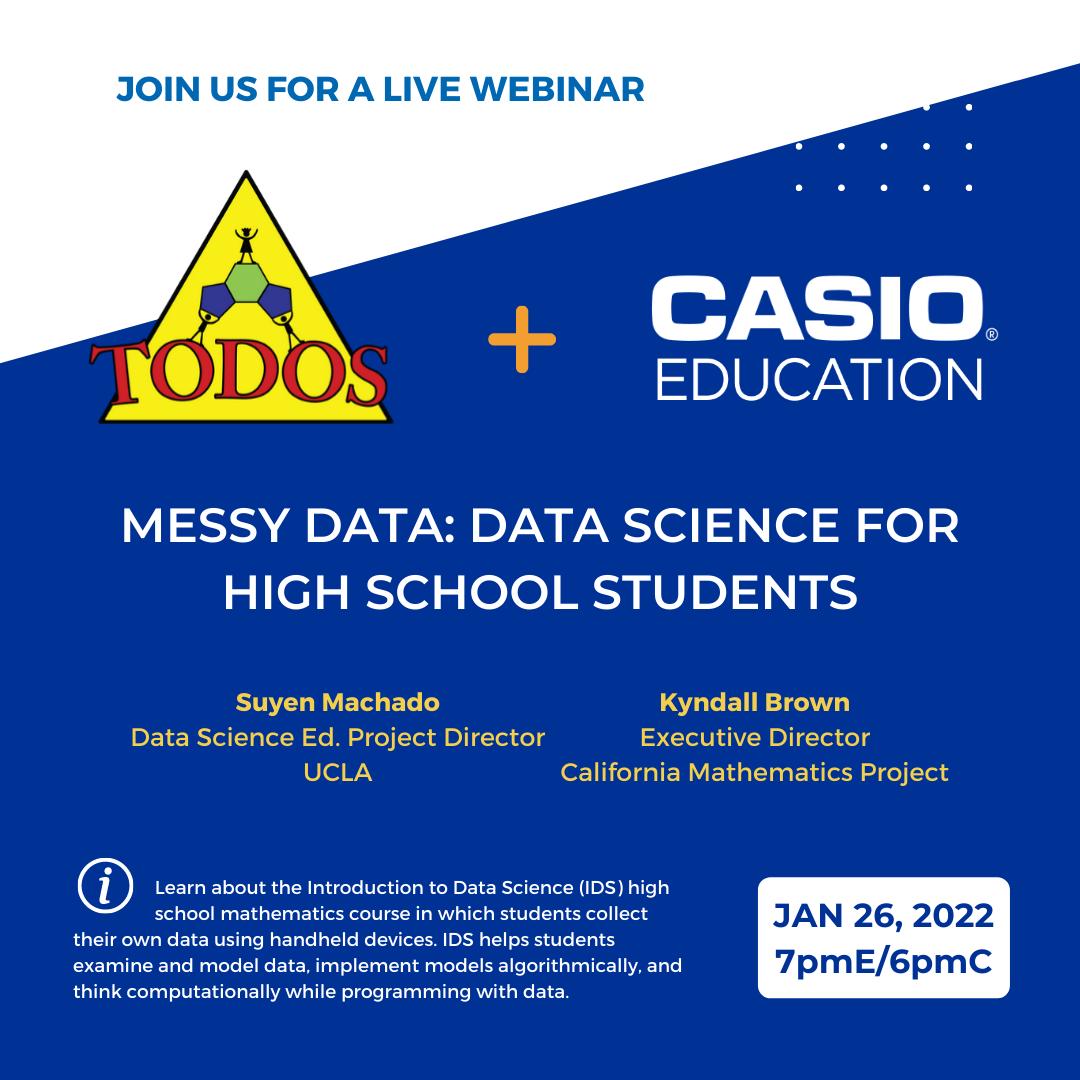
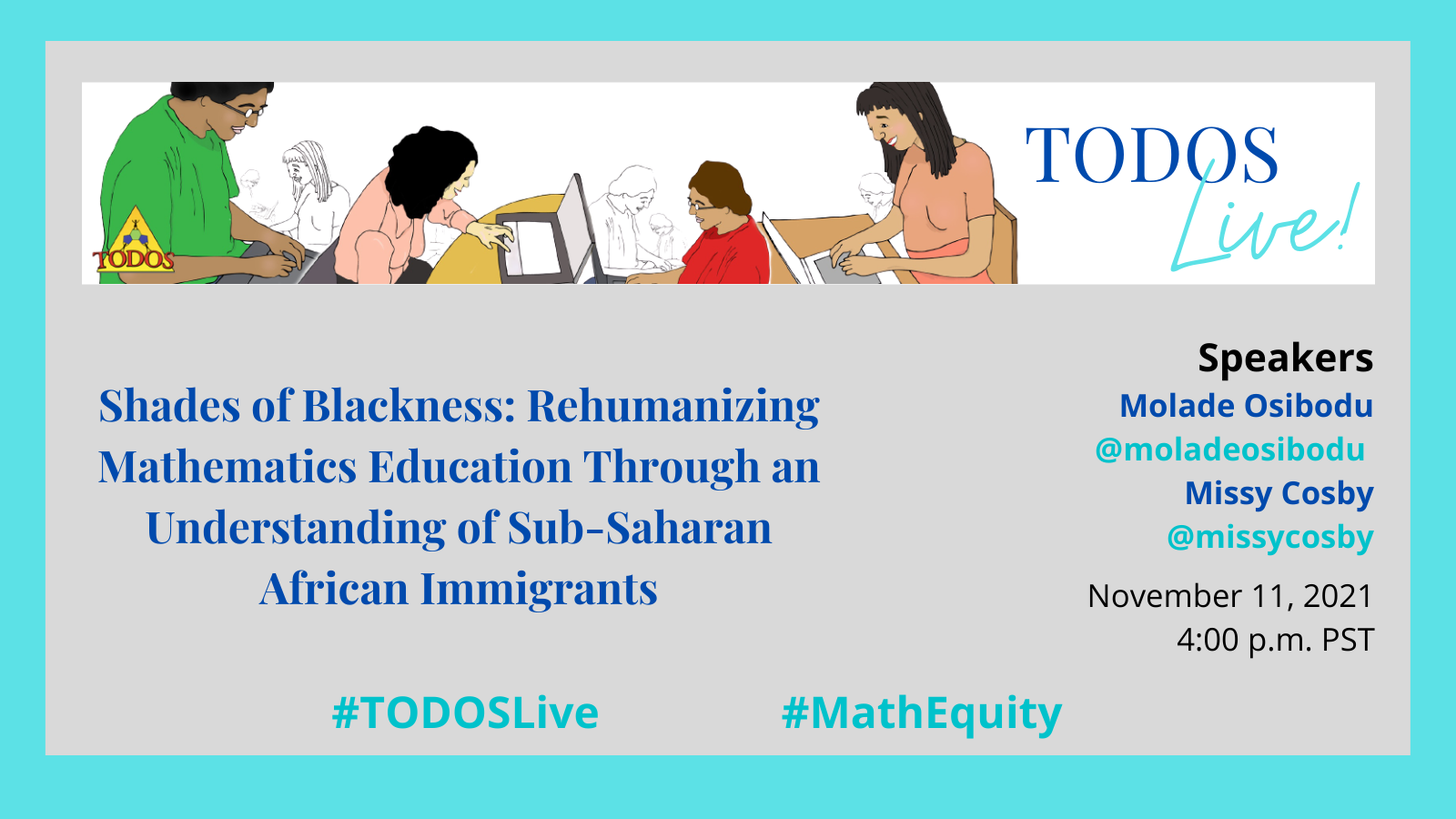
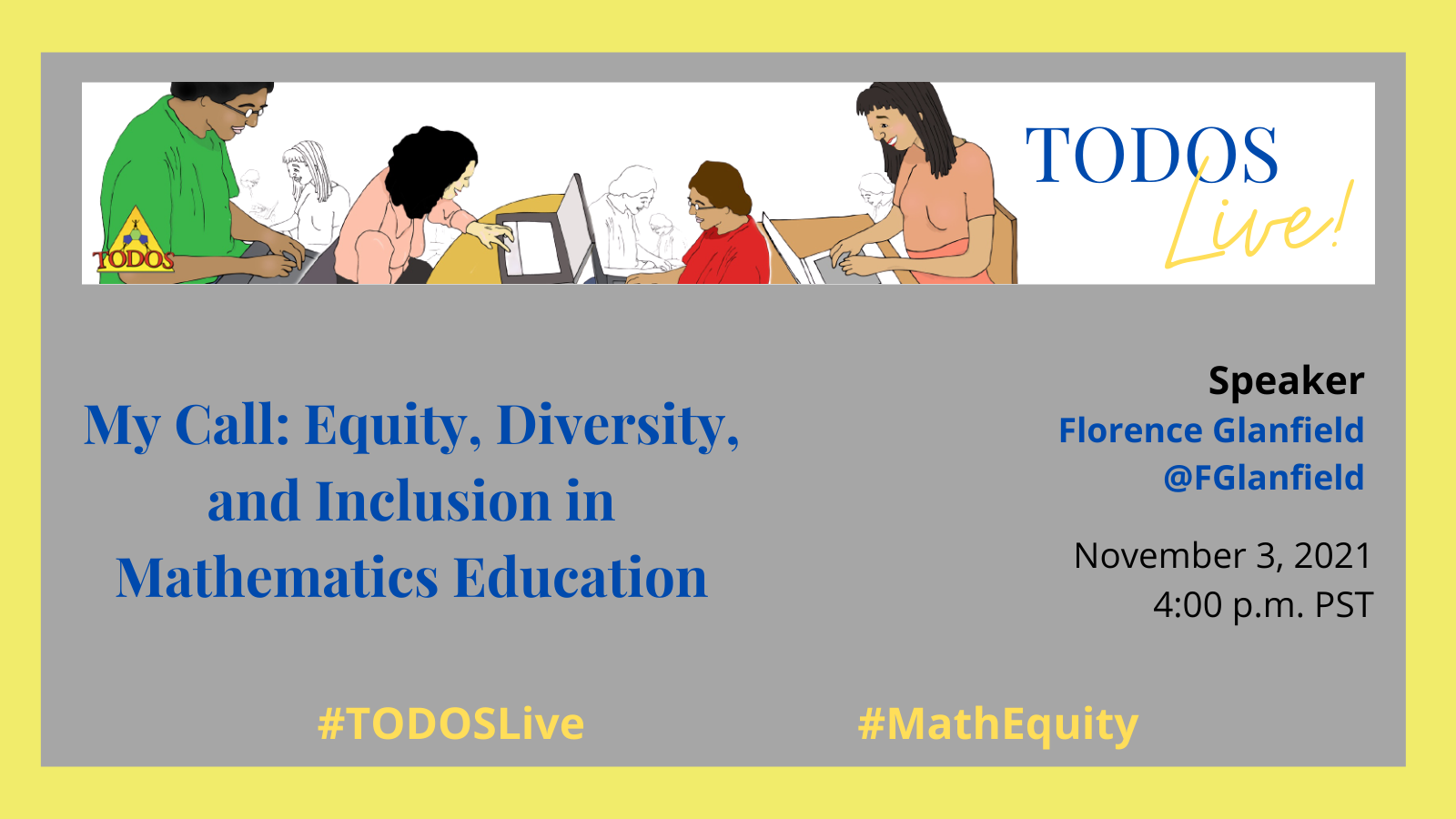 Description: September 30, 2021 was the National Day for Truth and Reconciliation in Canada. October 11, 2021 was known in some states as Indigenous Peoples' Day. These days are reminders that experiences of Indigenous peoples, nations, and lands are often not included in particular discourses around equity, inclusion, and diversity. In this session I will share my journey as a human being that identifies as Métis (one of the recognized Indigenous nations in Canada) and as a woman in the fields of mathematics and mathematics education. I will share the ways in which my early experiences in post secondary mathematics informed my work as a secondary mathematics teacher, and continue to inform my work and passion as a volunteer, university professor, researcher, and administrator.
Description: September 30, 2021 was the National Day for Truth and Reconciliation in Canada. October 11, 2021 was known in some states as Indigenous Peoples' Day. These days are reminders that experiences of Indigenous peoples, nations, and lands are often not included in particular discourses around equity, inclusion, and diversity. In this session I will share my journey as a human being that identifies as Métis (one of the recognized Indigenous nations in Canada) and as a woman in the fields of mathematics and mathematics education. I will share the ways in which my early experiences in post secondary mathematics informed my work as a secondary mathematics teacher, and continue to inform my work and passion as a volunteer, university professor, researcher, and administrator.